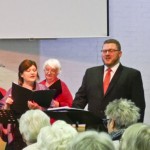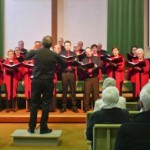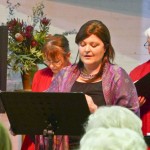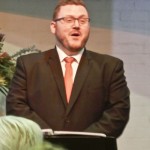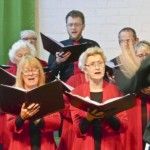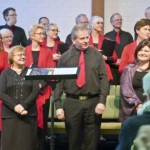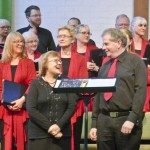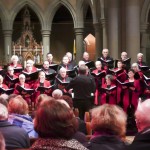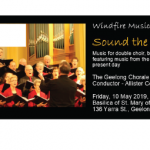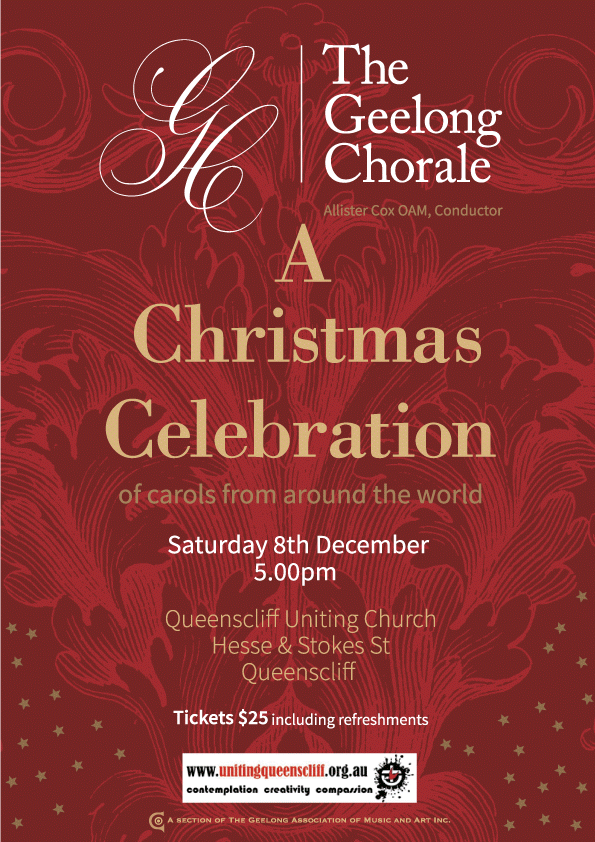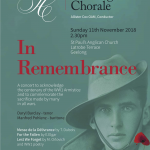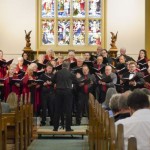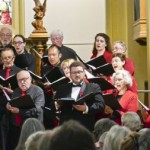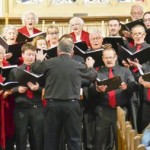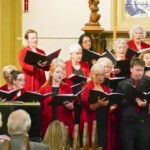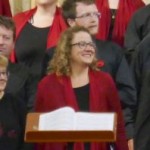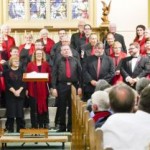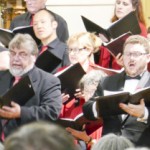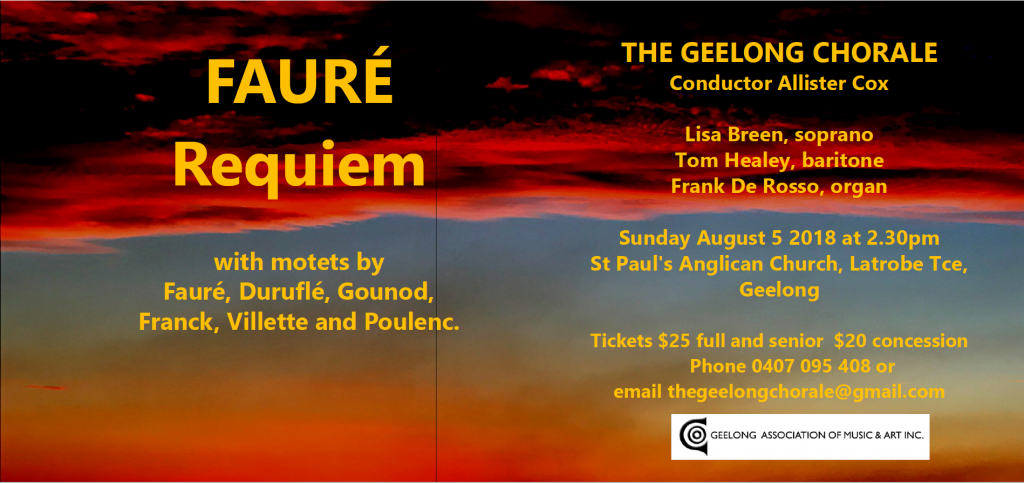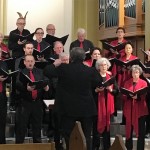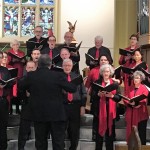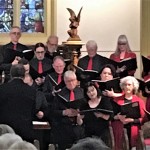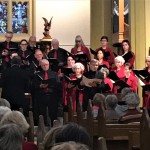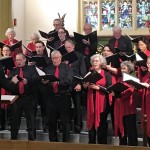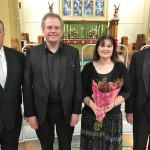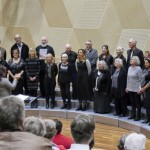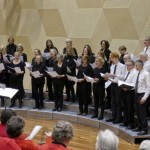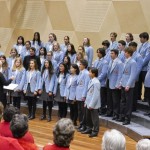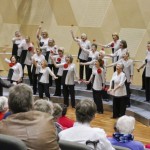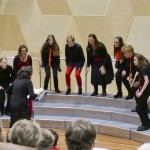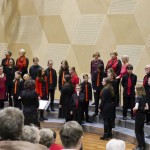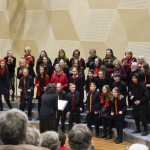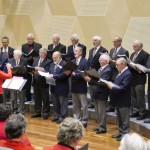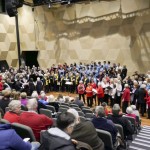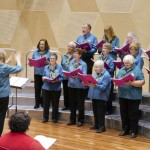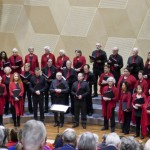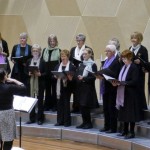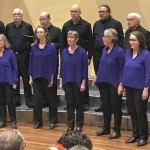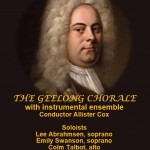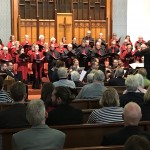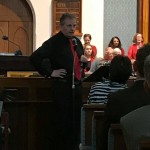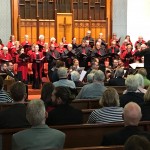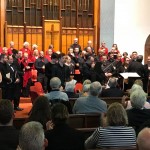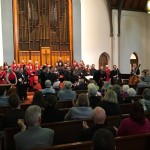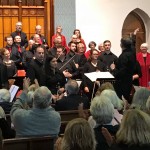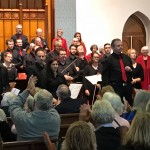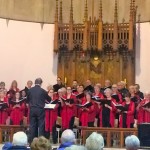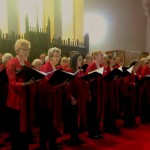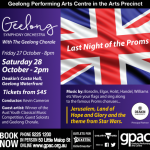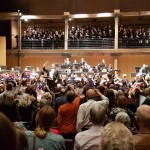Sunday 18 August 2019 at 2:30pm
St Luke’s Uniting Church, Barrabool Road, Highton.
Reviews
Great Moments, presented by The Geelong Chorale directed by Allister Cox. St Luke’s Church, Highton, August 18, 2019.
In the seven years since Allister Cox was appointed director of Geelong’s premier choir, he has set the group plenty of musical challenges.
In the past year alone, the Chorale brought an intensely moving In Remembrance commemorating the anniversary of WWI’s ending, as well as their complex collaboration Sound The Trumpets celebration in St Mary’s Basilica.
This concert arrived almost as a release from all that musical concentration. For this was easy, fun, and happy, both in its choice of material and delivery.
That cover-all title, Great Moments, carried the sub-text ‘Arias, duets and choruses from some of the best-loved operas, operettas and musicals’.
In practice, this came down heavily in favour of operatic choruses (9) to four operetta pieces and three extracts from musicals.
The programme neatly grouped each segment together with the Grand Operatic choruses up front before an interval, then the light opera and ending with a big Hollywood musical flourish.
So we began with Verdi’s joyful Brindisi from La Traviata and ended with an equally exuberant rendition of Rodgers & Hammerstein’s Oklahoma!
In between we heard a delightful musical selection delivered with a good deal of spirit and skill by the Chorale and its guest soloists Lisa Breen (soprano) and tenor David Campbell.
Such was the level of bonhomie that the two soloists, seated to one side when not called upon to sing, nevertheless joined in with most choruses including a memorable moment when the ebulliently jovial David couldn’t resist singing Bernstein’s West Side Story I Feel Pretty along with the female chorus.
He had previously delivered a wonderfully romantic solo of Donizetti’s Una Furtiva Lagrima from L’elisir d’amore as well as leading the Chorus’ tenors and basses in two lusty numbers, Tower Warders from G & S’s Yeoman Of The Guard and You’re Back Where You First Began from Franz Lehar’s The Merry Widow.
For her part, Lisa gave us a beautiful solo version of Un bel di vedremo from Puccini’s Madam Butterfly as well as The Merry Widow’s Vilia. As a reviewer and performer I’ve experienced Lisa’s singing in many capacities for more than 20 years, and I don’t think I’ve heard her sing better. This was especially evident when she led the full Chorale in an a cappella version of Gershwin’s Summertime from Porgy and Bess. This sublime moment was, conversely, the only piece that had not involved Kristine Mellens’ skilled piano accompaniments.
Lisa and David joined, both individually and as a duo, with the Chorale in their spirited versions of big favourites The Anvil Chorus, Wedding Chorus and Voyagers Chorus, while deputy conductor Anne Pilgrim led the Chorale’s Sopranos and Altos in Verdi’s Witches Chorus from Macbeth.
Director/conductor Allister Cox introduced each work with his familiar charm and depth of knowledge – along with some carefully chosen humorous insights – while at the finish, soloists Lisa and David spontaneously left their seats to squeeze on to the Chorale’s rostrum and deliver those joyful Oklahoma! whoops.
It was a moment that captured exactly the energy and cheer of what had been such a skilfully delivered but delightfully lighthearted musical afternoon.
– Colin Mockett
https://entertainmentgeelong.com/reviews-2019-1
Great Moments: The Geelong Chorale – Sunday, 18th August, 2019
Posted on August 19, 2019
St Luke’s Uniting Church, Highton
Conductor: Allister Cox OAM
Accompanist: Kristine Mellens
The Geelong Chorale is a chamber choir. Therefore, a foray into musical theatre, opera, operetta and musical comedy is rather outside the choir’s usual musical fare. Allister Cox, musical director for some years, is a long-time performer in musical theatre, and directed the choir and two excellent soloists with assurance.
The first half of the program was devoted to grand opera, with choruses, solos and duets from Verdi, Mozart, Donizetti, Gounod, Puccini and finishing with a rousing performance of the Easter Hymn from Cavalleria Rusticana. There was a little staged drama – the program began with Brindisi (a drinking chorus) from La Traviata. The choir (as people at at party) chatted animatedly during the introduction till the tenor, David Campbell, entered from off stage singing the well-known verse followed by the chorus with the choir before soprano Lisa Breen entered to sing the verse reprise. It is good to hear Lisa’s lovely singing after some time. We hope to hear more of her in future concerts.
David Campbell’s acting skill came out throughout the program, no more so that in his aria Un Furtiva Lagrime with a stunning love-lorn cadenza.
Kristine Mellens, the Chorale’s accompanist, had a near impossible task – attempting to emulate an orchestra. Kristine wrought all possible tone from the available upright piano playing with drama, a sense of style and sensitivity (especially in David Campbell’s aria from L’elisir d’amore).
Deputy conductor, Anne Pilgrim conducted the women of the choir in The Witches’ Chorus from Verdi’s Macbeth. There was a fine sense of dynamics, and some percussion in the background as the witches announce Macbeth’s arrival. Unison singing brought out the excellence of the choral lines, even though the sopranos were depleted somewhat in this program.
The second half of the concert produced lighter fare – with excerpts from Yeomen of the Guard, Die Fledermaus, The Merry Widow, Porgy and Bess, West Side Story and concluding with a rousing performance of the title song from Oklahoma with soloists joining the choir.
The choir was in its element in an a capella arrangement of Summertime from George Gershwin’s Porgy and Bess with Lisa Breen excelling in a jazz style performance. This arrangement, which includes intricate scat singing from the choir, would be well worth keeping in the choir’s repertoire.
The near capacity audience included many who are not regulars to concerts from GeelongChorale. Judging from the warmth of the applause, they were not disappointed.
The Geelong Chorale’s final performance of 2019 is Magnificat: Music to Celebrate Christmas, on December 7th at 5pm at Christ Church, Geelong.
From Helen Lyth at

